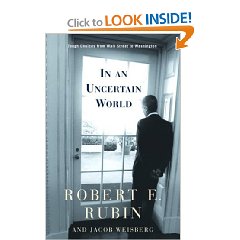Edit of 21 Dec 07 to recommend update and reissuance in collaboration with John Bogle, author of The Battle for the Soul of Capitalism: How the Financial System Underminded Social Ideals, Damaged Trust in the Markets, Robbed Investors of Trillions – and What to Do About It and a few others whose books are linked below.
Rubin is self-effacing and not at all, in any way, claiming personal credit for how well it went as America experienced one of its greatest economic booms, despite some rather scary international threats to our economic security. I believe this will be a classic reference for years to come.
1) Early on, and then throughout the book, Rubin does a fine job of documenting and explaining why markets, which are relatively autonomous beasts, and at least as important as governments and government policies, in setting the economic security environment.
2) A corollary to the above, but all the more important because it dovetails precisely with Henry Kissinger's caution (“Does America Need a Foreign Policy”), is Rubin's detailed articulation of how U.S. politics and US policy mechanisms are not now well-suited to coping with the new risks of the global economy. The speed and reach of the marketplace is now such that the industrial-era government bureaucracies and 1970's information technology stovepipes are completely inadequate–however well-intentioned a President might be, the current structure and current approaches to establishing economic strategies and policies are NOT OKAY.
3) Rubin is quite excellent in explaining in a very understandable manner how specific fiscal policies toward other states (e.g. Mexico) can be directly related to consequences in terms of illegal immigration (surging if Mexico is allowed to collapse), illegal drugs and crime, and trade.
4) Especially helpful in this book is its emphasis on the importance of educating the American public as a pre-requisite to the politics of making the right economic decisions for America. Rubin quotes Clinton as saying that one of his (President Clinton's) greatest lessons learned from his two-term Presidency was the need to do the public education (political strategy) before the public politics and deal-making. Senator David Boren (today President of the University of Oklahoma) and Mr. David Gergen have made this point earlier (“Preparing America's Foreign Policy for the 21st Century”), but Rubin's focus merits strong emphasis, because in combination, our mediocre policy structure and our mediocre public understanding combine to create not one but two devastating Achilles' heels for US economic security policy-making.
5) Rubin excels at documenting the direct relationship between poverty and inner-city distress and poor education of important segments of America's population, and its economic well-being. He extends this analysis internationally, focusing on how vital it is to extend the fruits of prosperity across all nations and peoples, if the US is itself to have sustainable economic stability and prosperity.
6) The book is a case study in decision-making, a manual of how to and how not to approach problems for which, as he notes with frequency, there are no certain outcomes. I was very impressed by his acute sensitivity to the fact that most subordinates are incapable of speaking utter truth to their bosses–they pull their punches. This is equally true, as he explicitly notes, of Chief Executive Officers invited to meet with the President. Rubin appears gifted in his ability to draw out the concerns and negatives from all subordinates, with a special kindness extended by him to the most junior or front-line subordinates, a kindness that is repaid in full with honest opinion.
7) I noticed some very strong observations from Rubin on the inability of the Department of State and of the Central Intelligence Agency to provide him with core information that he needed on Indonesia, among other fiscal hot spots. Lee Kuan Yew from Singapore turned out to be much more useful to him in understanding the context and possibilities. From this Rubin draws the lesson that the Department of State needs to get smarter about economics, and that a new kind of Foreign Service Officer is needed, one that is not just following political matters, but economic matters. Indeed, I would go so far as to say that State needs to migrate from the old POL-MIL mind-set, to a new POL-ECON mindset. CIA must of course get much better at understanding demography, public health, economics, and infrastructure issues down to the province and township letters, something that will require them to finally take Open Source Intelligence (OSINT) much more seriously, and to become competent in 29+ languages.
8) “Rubin's Rules”, actually prepared by his staff as a going-away gift when he departed Treasury, are listed on page 251, with an 11th rule on page 252, and are alone worth the price of the book. They will not be repeated here, they are precious.
9) Rubin is critical of the private sector for having over-invested in Third World ventures without doing the due diligence related to risk assessment, and he ventures into some discussion of the importance of defining and communicating best practices, codes and standards for debt management, bankruptcy, deposit insurance, and bank supervision. I could not help but reflect on how much more important the ISO might become if it also becomes central to economic security and stability by contributing a standards process that helps reduce and mitigate risk for all.
10) There are many other gems in this book, from his review of “deficit economics” (and why it is an idiot idea writ large), to how Monica Lewinsky cost the US taxpayer much more than the cost of the impeachment proceedings, to the need to always review old assumptions, to the dangerous reliance by Wall Street on models (as with Long-Term Capital Management failure), to the need to redefine GDP calculations (in addition to deducting negative investments like prisons and health care that others have recommended, Rubin suggests that the presence or absence of positive investments related to environmental sustainability need to be included).
This is a solid serious book about core economic security issues. I venture to say that no one could run for President, or be an effective President, without absorbing all that Robert E. Rubin has to teach us. His assistant author, Jacob Weisberg, is to be congratulated for helping bring this extraordinary work to the marketplace. We all benefit.
See also with reviews:
Natural Capitalism: Creating the Next Industrial Revolution
Off the Books: The Underground Economy of the Urban Poor
The Working Poor: Invisible in America
The Global Class War: How America's Bipartisan Elite Lost Our Future – and What It Will Take to Win It Back
Rogue Nation: American Unilateralism and the Failure of Good Intentions
Blood Money: Wasted Billions, Lost Lives, and Corporate Greed in Iraq
Vice: Dick Cheney and the Hijacking of the American Presidency
Al On America











